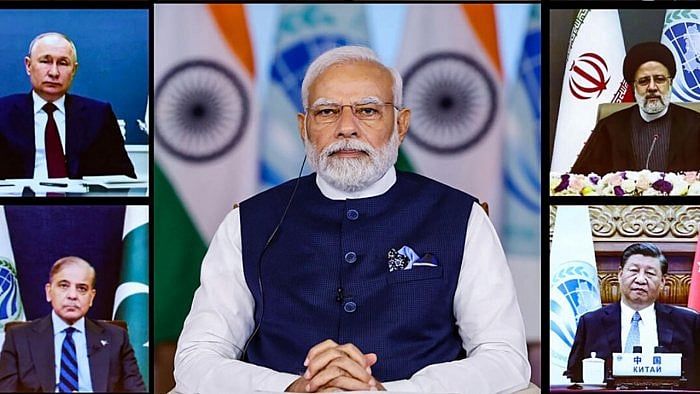
India has the privilege of chairing both the Shanghai Cooperation Organization (SCO) as well as the G-20 this year. Although there are huge differences between them, both organisations are important in their own way for India. For instance, while the G-20 accounts for 85 per cent of the world GDP and 75 per cent of the world population, the comparative figures for the SCO are 33 per cent and 40 per cent respectively. The scope and coverage of activities under the G-20 are much greater as compared to the SCO. While the G-20 has all members of the G7 and P5, the SCO has only two P5 members and none from the G7. The G-20 is a global organisation while the SCO is a more limited regional organisation in Eurasia.
The huge strength of the SCO is that it has a membership of the four Central Asian countries (and now Iran too) which are not a part of the G-20 grouping. The Central Asian region has been called a part of India’s ‘’extended neighbourhood’’ which Prime Minister Narendra Modi modified to an ‘’extended family’’ in his opening statement at the SCO Summit on July 4 last. On account of India’s deep-rooted interests to ensure peace, security and stability on its borders and in the Eurasian landmass, it is imperative for India to stay deeply engaged with the SCO.
It is a measure of India’s bold, self-assured and independent foreign policy that it can effortlessly straddle across bodies like the SCO and the BRICS on the one side and the G-20 and the Quad on the other. India has effectively demonstrated its strategic autonomy by not openly criticising Russia for its aggression against Ukraine and continuing to buy large quantities of oil from it while at the same time having the determination to tell Russian President Vladimir Putin in front of the global media that ‘’this is not an era of war”. India’s strategic autonomy was again in full evidence when soon after a path-breaking and historic state visit to the US with a second address to the joint session of the US Congress, Modi had a long bilateral conversation with Putin over the phone to further strengthen the Special and Privileged Strategic Partnership between the two countries.
Also read | India’s SCO dilemma
The 23rd Summit of the SCO Heads of States was held in a virtual format. It was initially expected to be held in an in-person mode in New Delhi and all preparations were being made. But it was unexpectedly announced in late May that the summit would be held in a virtual format. No specific reason was advanced for this change except that there were a number of factors based on which this decision was taken.
Possibly the absence of confirmation of the physical participation of Chinese leader Xi Jinping in the summit might have been an important factor to change the meeting to a virtual format, but in hindsight, it proved to be a smart move. If all the anti-Western leaders like Xi, Putin, Iranian President Ebrahim Raisi, and Belarusian President Aleksandr Lukashenko had together descended on Indian soil and were seen hobnobbing with Modi, it would have sent a rather unfavourable message to India’s strategic partners in the US, Europe and elsewhere. This would have been particularly galling after a highly successful visit by the prime minister to the US.
In addition, it would have been uncomfortable for the Indian leadership to appropriately handle the visit of the Chinese president in view of the ‘’abnormal’’ relations between the two countries since the Galwan clashes in June 2020. It would also have been awkward to engage with Shehbaz Sharif in view of the fact that no communication between the two sides has taken place since the Pulwama attack in February 2019 and more specifically after August 2019 when even High Commissioners of the two countries were withdrawn at Pakistan’s behest because of the abrogation of Article 370 on the status of Kashmir. Under such circumstances, much of the media attention would have been on the bilateral engagements and on the activities of the leaders and not on the work done under India’s presidency of the SCO as had transpired during the foreign ministers’ meeting held in Goa on May 4-5.
The only downside of the decision to have a virtual summit has been that the Indian leadership has not been able to connect with the highest leadership of the five Central Asian Republics and Iran who would have come to India had it been held in-person. India will have to make an extra effort to reach out to all the leaders of Central Asia, particularly to the presidents of Uzbekistan and Kazakhstan, and Iran to advance the bilateral partnership with these countries.
A question has often been raised whether the adversarial relations between India and China and India and Pakistan could have a negative impact on the functioning of the SCO. This appears unlikely. The most that can happen is that the countries might make veiled critical references to each other in their plenary statements but, according to the mandate of the organisation, they will not be permitted to raise bilateral disputes during the deliberations. Such remarks by Modi and Sharif at the 23rd Summit of the SCO did not create a hurdle in adopting the New Delhi Declaration or the two documents on combating radicalization and promoting digitization.
There has always been a lingering apprehension that with the presence of countries like China and Russia and now Iran and next year Belarus, this organization might start adopting unmistakable anti-Western positions on specific global issues. That has not happened at this summit. It is unlikely to happen in the future too, because, in addition to India, the four Central Asian countries, which are members of the SCO, have good relations with Europe and the US and would not like them to come under a cloud because of any statements adopted at any organisation’s annual summits